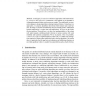Free Online Productivity Tools
i2Speak
i2Symbol
i2OCR
iTex2Img
iWeb2Print
iWeb2Shot
i2Type
iPdf2Split
iPdf2Merge
i2Bopomofo
i2Arabic
i2Style
i2Image
i2PDF
iLatex2Rtf
Sci2ools
106
click to vote
SSS
2007
Springer
2007
Springer
Robust Stabilizing Leader Election
Abstract. In this paper, we mix two well-known approaches of the fault-tolerance: robustness and stabilization. Robustness is the aptitude of an algorithm to withstand permanent failures such as process crashes. The stabilization is a general technique to design algorithms tolerating transient failures. Using these two approaches, we propose algorithms that tolerate both transient and crash failures. We study two notions of stabilization: the self- and the pseudo- stabilization (pseudo-stabilization is weaker than self-stabilization). We focus on the leader election problem. The goal here is to show the implementability of the robust self- and/or pseudo- stabilizing leader election in various systems with weak reliability and synchrony assumptions. We try to propose, when it is possible, communication-efficient implementations. In this work, we exhibit some assumptions required to obtain robust stabilizing leader election algorithms. Our results show, in particular, that the gap betwe...
Related Content
| Added | 09 Jun 2010 |
| Updated | 09 Jun 2010 |
| Type | Conference |
| Year | 2007 |
| Where | SSS |
| Authors | Carole Delporte-Gallet, Stéphane Devismes, Hugues Fauconnier |
Comments (0)

